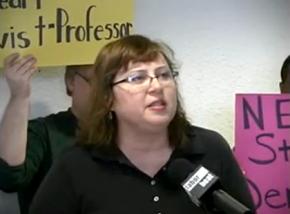A campus where free speech is banned
A case currently before a federal appeals court will test the limits of previous court rulings that have been used to virtually eliminate free speech for faculty at public colleges and universities.
The case, Capeheart v. NEIU et al., stems from the Northeastern Illinois University administration's attack on Professor for her role in advising a student group involved in antiwar activities. The university retaliated against her by denying her the department chair post she had been elected to fill. Then administrators sought to destroy Capeheart's credibility by launching a slander campaign against her.
This frontal attack on free speech would be chilling enough if it were confined to NEIU's Chicago campus. But NEIU based its defense on the U.S. Supreme Court Garcetti decision that guts the free speech rights of all public employees--even though faculty are supposed to be excluded from that ruling. A federal court agreed with the university and dismissed Capeheart's suit, prompting her to appeal.
The appeals court is expected to rule on Capeheart's case as early as April. Meanwhile, her fight is being taken up by a growing number of academics, students and free speech advocates. Capeheart gave a speech on her struggle at a February 17 meeting of the Chicago Coalition Against the Corporatization of Higher Education (CACHE). This is an edited version of her presentation.
IN FEBRUARY 2007, the same month that current President Sharon Hahs arrived at Northeastern Illinois University (NEIU), two students were arrested while peacefully protesting against CIA recruitment on campus. Various struggles for free speech and faculty governance have ensued. One such struggle is the subject of a federal lawsuit, Capeheart v. NEIU et al.
This suit was filed in response to slanderous accusations made against me during a campus meeting to discuss the arrest of those students. Then, NEIU Vice President Melvin Terrell claimed that I was being investigated by campus police for stalking a student.
There is no truth to this statement. I attempted to have the statement withdrawn and to have the VP issue an apology. Stalking is a felony sex crime and a serious allegation. When made against a professor, the accusation alone is damning.
Not only would the administration not retract the statement or offer an apology, I found that my career was in jeopardy. I was retaliated against in several ways, including not being appointed to chair my department after being elected to do so.

However, I was not alone in suffering for my speech. "Faculty expressed fear of losing their jobs or of diminished chances of retention or promotion if they were to voice their feelings" was one conclusion of the NEIU faculty senate input report in 2010. The Higher Education Research Institute (HERI) found that NEIU scored significantly below other institutions with only 7.5 percent of faculty agreeing that "administrators consider faculty concerns with making policy."
These findings are especially troubling when one considers NEIU. We are a highly diverse working class campus and one of the least expensive in the state of Illinois. NEIU is exactly the sort of place where those of us accustomed to being silenced gather in hopes of having access to the open debates that one expects at a university.
Rather than embrace free speech, the administration at NEIU prefers spending its students' hard-earned tuition dollars to quash free speech. Since Capeheart v. NEIU et al. was filed in 2008, years and an estimated hundreds of thousands of dollars have been spent to keep the case from court.
THE NEIU administration is relying on the U.S. Supreme Court's 2006 Garcetti v. Ceballos decision, which found that an employee of a sheriff's office was not within his rights when he criticized practices in his workplace. The decision states that an employee engaged in his or her duties does not have free speech protection.
This in itself is disturbing. But the Supreme Court did recognize the unique position of faculty and noted that the decision should not be applied to us. However, Garcetti was used to dismiss my case in federal court.
We have appealed this dismissal to the 7th U.S. Circuit Court of Appeals. A decision on the federal appeal is expected around April of this year. The American Association of University Professors (AAUP) provided an amicus brief for the appeal in which it wrote that the judge's ruling "is chilling and clear: university administrators need not tolerate outspoken faculty dissent on matters of broad public concern or on the university's institutional response to those concerns."
This is why the Supreme Court found that Garcetti should not be applied to faculty. It is often our duty to speak on issues of public and institutional concern. How do we carry out our duties if we have no protection of our speech? It seems the only answer in the administrations world is: you can speak as long as you agree, otherwise, shut up.
A recent news report exposed that two former vice presidents at NEIU are "double dipping" by taking six-figure retirement incomes at the same time that they continue to work at NEIU, earning six figures here as well.
Will faculty be allowed to speak against this perceived abuse of the retirement system, student resources and state dollars? Or will the university claim that such speech is our "official duty" and therefore punishable?
The university is spending untold dollars to assure that they can impose the latter. Don't question, don't engage, just agree. We must fight these abuses and take back our rights to speak.


